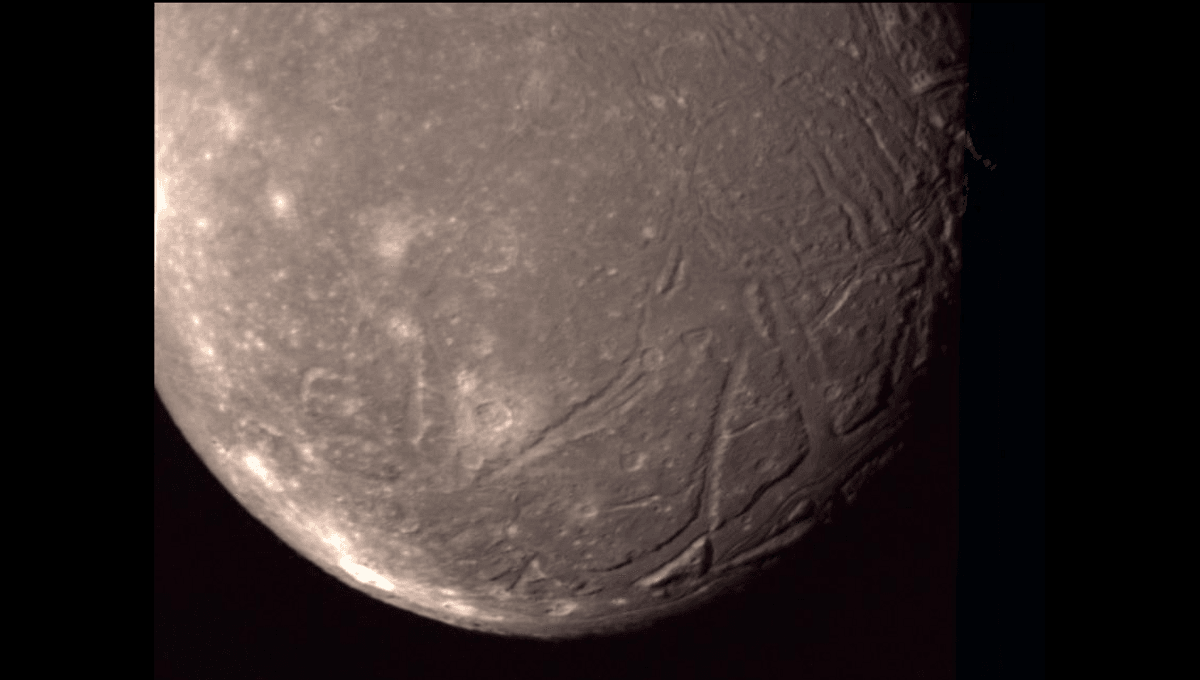
When Voyager 2 swung past Uranus 37 years ago, it sent back radiation data that mystified astronomers. A forthcoming paper attributes the observations to water molecules escaping from one of Uranus’s moons. This could indicate the presence of an internal ocean, and therefore a chance of life, along with the possibility of sampling these waters without needing to drill.
The moons of Uranus are relatively puny compared to those of the other gas planets; the largest being just 1,580 kilometers (982 miles) across. Without the extensive study from space probes that Jupiter and Saturn’s satellites have received, or the distinctiveness of Neptune’s giant moon Triton, their profile has been low – but that might be about to change.
Researchers have reanalyzed the Voyager 2 radiation data, and in a new paper accepted for publication, they make the case that the source is a band of energetic particles that were once water vapor.
“What was interesting was that these particles were so extremely confined near Uranus’ magnetic equator,” lead author of the study, Dr Ian Cohen of the Johns Hopkins Applied Physics Laboratory, said in a statement. Based on Voyager 2’s observations it seems the particles are restricted to a band between Ariel and Miranda, the innermost pair of Uranus’s larger moons.
Such concentration is inconsistent with the initial explanation for the particles, that they originated from the tail of Uranus’s strangely tilted magnetosphere.
We know Saturn’s moon Enceladus releases water vapor from geysers linked to an internal ocean, and Europa probably does the same, albeit less often. Consequently, there is nothing implausible about one of the Uranian moons, similarly covered in a thick layer of ice, having a heat source inside that can keep an internal ocean liquid. Similarly, if Enceladus can release enough water molecules to provide a substantial portion of Saturn’s E ring, one of the two moons could certainly account for these energized particles.
From liquid water to life is certainly a big step, but as recent evidence has shown, Enceladus has all the ingredients we are aware are required. It’s likely that whichever of Arial and Miranda is doing the leaking is similarly resourced.
Perhaps life finds it difficult or impossible to get started in an icy moon’s lightless ocean. If not, however, the more locations there are in the solar system, the more chances we will find something. If some of the icy candidates have life and others don’t, the reasons why could prove almost as revealing as comparisons in the even more exciting scenario where several of the moons host biology.
There is, however, a more disappointing explanation; that the particles are the result of sputtering of surface ice on one of the moons. Sputtering occurs when high-energy particles from sources such as the solar wind hit the surface of an object without an atmosphere and knock other particles loose.
Why sputtering would occur only on one or both of Ariel and Miranda, and not on three moons of similar size, has not been explained, but Cohen admits it is as plausible as the geyser hypothesis. “Right now, it’s about 50-50 whether it’s just one or the other,” Cohen said.
Cohen admits we will probably not settle the question – nor which moon is responsible if it’s only one – using data collected by Voyager 2 before he was born. The encounter was simply too brief, and the equipment too primitive, to tell us what we need.
Yet another reason why a Uranus mission is getting to the top of NASA’s priority list.
The work is to be published in Geophysical Research Letters. A preprint is available here.
Source Link: Voyager Measurements Boost Prospects Of Life Around Uranus (On A Moon)